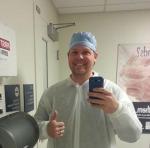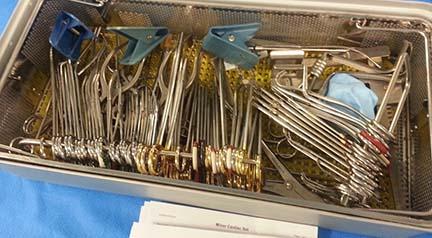MBA Student Helps Hospital Improve Surgical Instrument Flow
July 24, 2014

Isenberg's MBA practicum assigns individuals and teams of second-year students in its full-time MBA program to semester-long consulting projects at businesses and nonprofits. Recent clients include EMC and Lego, local and regional businesses, and nonprofit organizations like Mass General. The latter, notes Fish, ranked second best among U.S. hospitals in a 2013 survey by US News & World Report.
Fish's study focused on the Central Sterile Processing and Supply (CSPS) department's prep-and-pack segment of a six-stage cycle that begins with the decontamination of surgical instruments and culminates with their deployment in the operating room. In prep-and-pack, employee teams in three around-the-clock shifts assemble surgical instrumentation kits for their next step-sterilization-and for their ultimate destination: the hospital's clinics and operating rooms.
"Our goal was to improve the efficiency of prep-and-pack and, ultimately, of the entire cycle," explains Fish. "That included reducing the time to assemble the packs and ensuring the accuracy of their contents. When you consider that MGH performed 38,000 operations and its CSPS department cleaned over 8.6 million instruments in 2012, even small error rates scale out to numbers worth targeting."
Improving speed and accuracy, then, translate to significant cost savings and improved patient care, he emphasizes. "And if instruments in the cycle in any way are not treated properly, it could lead to their damage, to an operation's delay, or to the rare case where a sterile operating field is compromised."

Variability and Its Consequences
For starters, Fish established baseline measurements for the time required to assemble completed kits during prep-and-pack. He found considerable variation across seven categories of kit assembly, with basic general surgery kits requiring the least time (averaging 1.48 hours) and general laparoscopic surgery kits requiring the most (averaging 3.02 hours). There was variation within the categories as well: some kits, he noted, took five hours to assemble. Key consequences of long assembly times, emphasized Fish, included time wasted while kits sat after decontamination and extended search times for missing instruments. "The high level of variability," he added, "indicated inefficiency in the process and the need for standardization. Fortunately, those challenges can be addressed through targeted process improvement."
Addressing the Problem
The Isenberg MBA student identified nine prep-and-pack problems, for which he proposed recommendations and courses of action. Some of the challenges included missing instruments, the arrival of dirty instruments from decontamination, and shortcomings in the organization of the prep-and-pack department, including the physical configuration of its workspace.
To help the hospital address his proposed solutions, Fish created a matrix with easy-to-difficult changes on one axis and low-to-high impact changes on the other. "Clear project prioritization and goal setting is important for any project to achieve early successes," remarked Fish.
Networking and Mentors
For his practicum, Fish teamed up with Wilton Levine, an anesthesiologist and Associate Medical Director of Perioperative Services at Mass General, who has helped drive the hospital's initiatives to improve its perioperative processes. Fish first met Levine at a conference in Hyannis devoted to the "lean process" work and legacy of one of its founders, Shigeo Shingo. Fish and Levine hit it off and the Isenberg student began volunteer research at Mass General in November, which led to his practicum.
Fish's involvement with health care systems dates to June 2012, when with an introduction from then Isenberg associate dean and MBA director Alan Robinson, he began a two-year quality management internship with the VA Hospital in Northampton. At the VA, he worked with the systems redesign coordinator Anne Wilson, an advocate of lean processes and continuous improvement. "You might be surprised how progressive VA hospitals have become in applying lean process practices," Fish remarks.
Shortly after graduation from Isenberg, Fish joined the Massachusetts Health Policy Commission as a Program Officer for Strategic Investment. "The Health Policy Commission," he notes, "is charged with helping community hospitals drive healthcare costs down by improving efficiency and increasing collaboration. Without question, my Isenberg practicum at MGH, my internship with the VA, and my classroom work at Isenberg have given me a strong head start in my new role."